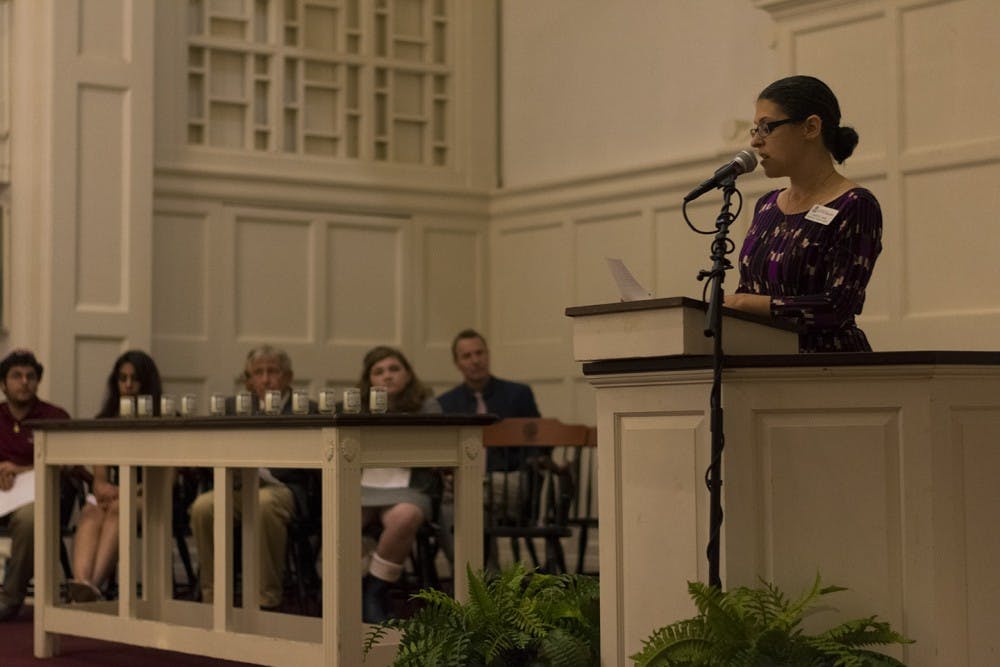Rutledge Chapel hosted a vigil with members of all faiths at USC on Nov. 2 honoring the 11 killed by anti-semitic violence in Pittsburgh.
Tree of Life Synagogue in Pittsburgh, Pennsylvania became a target of anti-semitic violence on Oct. 27 as 11 were shot and killed with others injured during their time of worship. After a week of mourning, particularly for the Jewish community, interfaith initiatives at USC brought different representatives to reflect, pray and collectively mourn the lives lost.
“The United States is arguably the most religiously diverse nation in the world and certainly South Carolina is no exception to that reality,” said Adrian Bird, president of Interfaith Partners of South Carolina. “We are a state of many faiths. But being diverse is simply a statement of fact. It doesn’t tell us how well we get along with each other, or how well we know one another.”
Vice president of Hallel and third-year public health student Anna Book was one of the student speakers at the vigil. She was moved by the support from the Jewish community, other religions and USC as a whole while grieving.
“I thank you all so much for being here today,” Book said in her speech. “I thank you for seeing the hate and the anti-semitism in our world and not turning a blind eye, but acknowledging with your presence here that the only way we can stop this hate and reverse this rhetoric is by standing together against it.”
The Jewish community in Columbia was represented by both students and by Rabbi Eric Mollo of Tree of Life Congregation. Following the lighting of the 11 candles in honor of the 11 deaths, he sang the traditional “El Malei Rachamim” which is a prayer for those that have died and is commonly sung at Jewish memorials and funerals.
Rev. Tom Wall, representing the Methodist Student Network, and John Cook, representing UKirk Presbyterian Ministry and Shandon Presbyterian Church, spoke on behalf of the Christian faiths at USC and their solidarity with the Jewish community at USC.
“To our Jewish brothers and sisters and all brothers and sisters of all faiths, I am here to express our solidarity ... with you as we stand against fate and evil and violence and all that would threaten life-giving, life-changing Shalom that God calls us all to practice and act and develop,” Cook said.
Solidarity continued, not just between religious organizations, but also between students. Kennedy Henderson, a first-year political science student and a member of Freshman Council, came to the vigil to represent Student Government as the voice of students.
“Because we represent the student body, it’s important to know the student body cares about people outside of USC, to be active global citizens,” Henderson said.
Young people are leading the nation in the wake of shootings and racial and religious violence as evidenced by the March for Our Lives movement. Cook shared the story of his fifth grade daughter, Lydia, emailing her teachers because she wanted to make sure her school was a place without hate against those with different beliefs after attending an interfaith service to honor those that died. His daughter inspired him to ask how he himself could make an impact.
“She asked to meet so she could talk about what the school is going to do to address issues of hate and violence,” Cook said. “In response to that email, all the fifth grade teachers at the school met with her to talk about how they could both plan and implement those plans in the days ahead at the elementary school.”
College students, professors and members of the community came together to honor the victims of hatred and left motivated to understand those that are of other religions in order to bridge the gap violence and hatred has created in this country.
“We might not be able to change the world,” Cook said. “But we might be able to change somebody's world for the better.”

